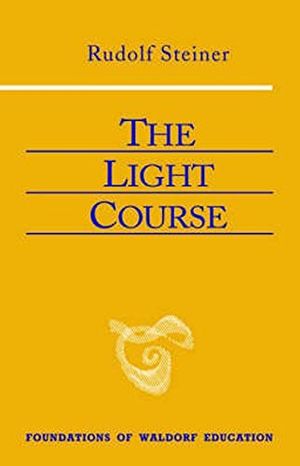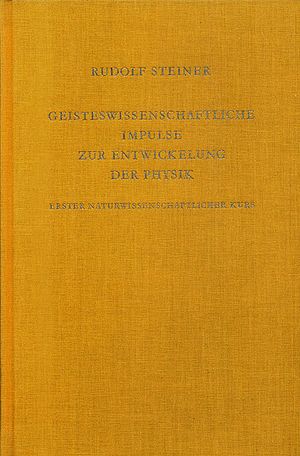GA 320


The Light Course: First Course in Natural Science; Light, Color, Sound-Mass, Electricity, Magnetism
Geisteswissenschaftliche Impulse zur Entwickelung der Physik I
Ten lectures, Stuttgart 23 December 1919 to 3 January 1920. With a discussion paper, Dornach 8 August 1921, ten pages of notes on the subject (facsimile) and a written answer to questions on the nature of some basic scientific concepts (facsimile).
Contents
Discussion vote, Dornach, 8 August 1921
First lecture, Stuttgart, 23 December 1919
Three directions of research in ordinary natural science. In contrast to this, Goethe's method. Position of mathematics: phoronomy and mechanics. Central forces with potential - peripheral universal forces without potential.
Second lecture, 24 December 1919
Bridging the gap between phoronomy and mechanics. Buoyancy of the brain. Contrast of mass and light in relation to consciousness. Origin of colours through the prism. Contrast of muscle and eye in relation to the astral body.
Third lecture, 25 December 1919
Goethe's first experiment with the prism. Colours as marginal phenomena. Double prism, converging lens, diverging lens. Narrowing or widening of the light cone instead of refracted light rays. Elevation, sighting power of the eye. Organisation of the eye.
Fourth lecture, 26 December 1919
Primordial phenomenon of colour theory. Subjective spectrum. Newton's conception of the corpuscles of light. Fresnel's experiment. Undulation theory. Extinction of light by the sodium flame. "Decomposition" of darkness.
Fifth lecture, 27 December 1919
Kirchhoff-Bunsen experiment. Phosphorescence, fluorescence, body colours. Contrasting relationship of man to space and time on the one hand, to speed on the other; to light and colour. Sixth lecture, 29 December 1919
Reality of the dark next to the light. Sucking in of light by the soul, sucking out of consciousness by darkness. Darkness and matter. Experience of warmth and experience of light. Expressing phenomena purely, thinking of unknown causes. Gravity. Whole and part. The inorganic. Sound as honest air vibration, light as hypothetical ether vibration. Discovery of the interaction of light with electromagnetic forces.
Seventh lecture, 3O. December 1919
Coloured shadows, their objectivity. Scope of validity of the terms "subjective" and "objective". Three stages of man's relation to the external world in light, heat and air. Breathing process and sound perception. Diversity of the senses. Heat equivalent.
Eighth lecture, 31 December 1919
Sound and vibration. Velocity as the real. Is sound subjective? The sympathy of phenomena. The organisation of the sense of hearing: Lyre of Apollo. Only together with the larynx does the ear become a whole, comparable to the eye. The relationship of sound to air vibration.
Ninth lecture, 2 January 1920
Phenomena of electricity. Striving of the 19th century for an abstract sameness in the various forces of nature. Hertzian waves as the culmination of this. The revolutionary phenomenon of cathode rays. Their modification: X-rays, α-, β-, γ-rays. Waking and sleeping, thinking and will, light and electricity. In electricity and magnetism one studies matter concretely.
Tenth lecture, 3 January 1920
Experiments on cathode rays and X-rays. Summarising points of view: The course of physical science unhinges materialism. The necessity of using imagination to penetrate into the phenomena themselves. The shaking of the old geometry in the 19th century: Lobachevsky. The phoronomic ideas do not originate from the sensory phenomena, but from the will. The dream of nature of modern mankind. The statistical method loses the thought, thereby comes into reality. Electricity phenomena and sound.
Appendix
Notebook entries (facsimile, archive no. NB 44)
Answers to six questions about the nature of some basic scientific concepts (facsimile)
Literature
- Rudolf Steiner: The Light Course: First Course in Natural Science; Light, Color, Sound-Mass, Electricity, Magnetism. CW 320 (Foundations of Waldorf Education, 22). 2nd Edition. Anthroposophic Press Inc 2002, ISBN 978-0880104999
German
- Rudolf Steiner: Geisteswissenschaftliche Impulse zur Entwickelung der Physik I, GA 320 (2000), ISBN 3-7274-3200-4 English: rsarchive.org German: pdf pdf(2) html mobi epub archive.org
 |
References to the work of Rudolf Steiner follow Rudolf Steiner's Collected Works (CW or GA), Rudolf Steiner Verlag, Dornach/Switzerland, unless otherwise stated.
Email: verlag@steinerverlag.com URL: www.steinerverlag.com. Index to the Complete Works of Rudolf Steiner - Aelzina Books A complete list by Volume Number and a full list of known English translations you may also find at Rudolf Steiner's Collected Works Rudolf Steiner Archive - The largest online collection of Rudolf Steiner's books, lectures and articles in English. Rudolf Steiner Audio - Recorded and Read by Dale Brunsvold steinerbooks.org - Anthroposophic Press Inc. (USA) Rudolf Steiner Handbook - Christian Karl's proven standard work for orientation in Rudolf Steiner's Collected Works for free download as PDF. |
